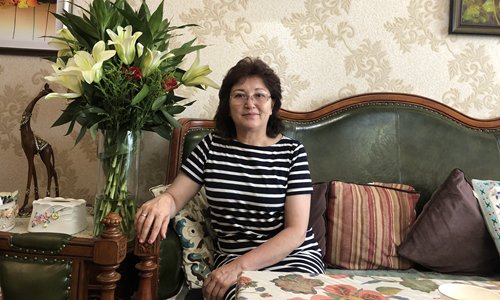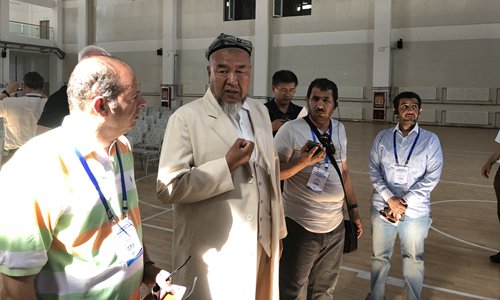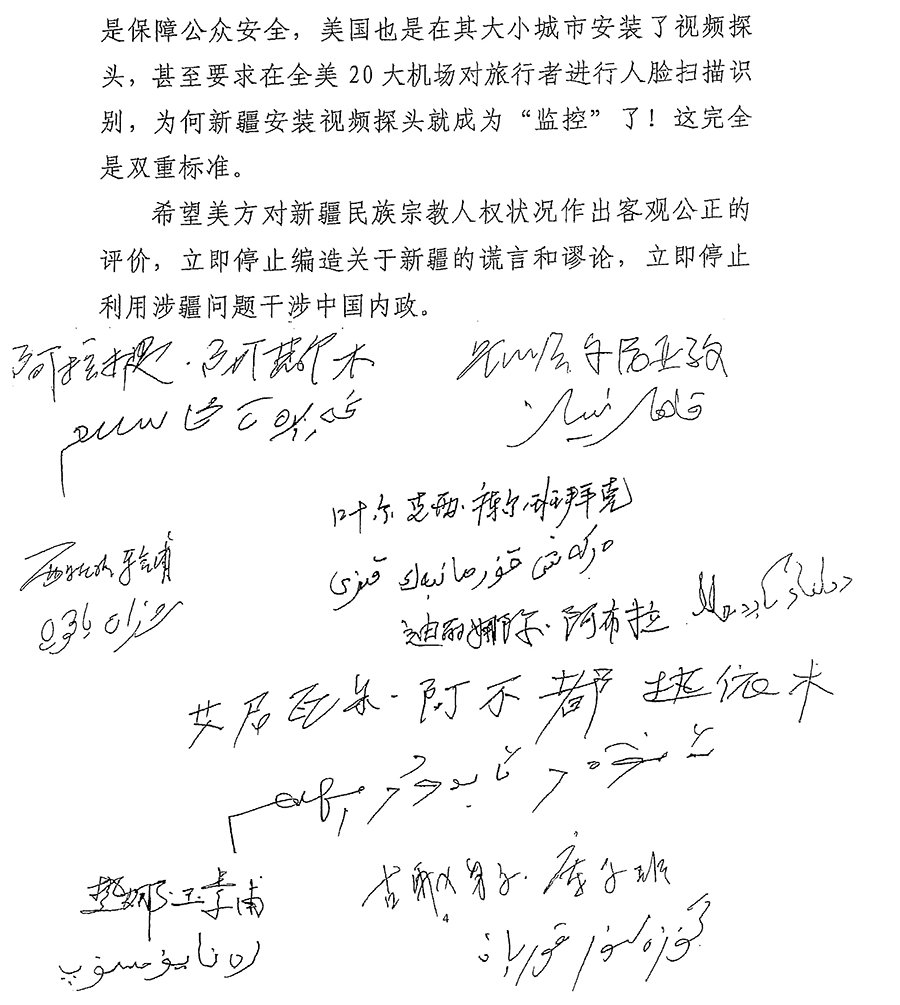HOME >> CHINA
Xinjiang letter signatories blast West’s bias
By Liu Xin in Urumqi Source:Global Times Published: 2019/7/26 20:06:03
It’s time Xinjiang people’s own voice is heard by outside world: expert

Yeerkexi Kuerbanbaike, vice president of Xinjiang Writers Association. Photo: Liu Xin/GT
Government officials, scholars and religion experts from Northwest China's Xinjiang Uyghur Autonomous Region defended the country's counter-terrorism and de-radicalization policies in the region against groundless accusations from the US and other Western countries.
China's State Council Information Office (SCIO) released a white paper on Sunday to clarify major historical matters on Xinjiang, like it has never been "East Turkistan" and the Uyghurs are not descendants of the Turks.
In response to US State Secretary Mike Pompeo's recent criticism of China's policies in Xinjiang, close to 100 scholars and religious experts released a joint letter on July 19 to express their discontent.
Two experts who signed the letter spoke with the Global Times, sharing stories behind the public letter and their opinions on the latest white paper.
Wanting to be heard
Yeerkexi Kuerbanbaike, vice president of the Xinjiang Writers Association, said she learned of Pompeo's accusations from the news and her first reaction was, "Why did a country's senior official make such groundless and irresponsible remarks on China's regional situation and policies in Xinjiang?"
"China is the home of all ethnic groups living here. We have the ability to solve problems that happen within our family, and we are doing quite well on this," Yeerkexi told the Global Times on Thursday.
"Why would anyone eavesdrop on others and spread rumors and criticism based on guesswork? It's like the sound of scratching glass with nails, which is deplorable," she said.
Anger and disappointment with Pompeo inspired a few scholars to pen the letter, and many others echoed their feelings and joined them in the letter's composition.
"We felt it is time to make our voice heard by the outside world. For foreigners who have never been to Xinjiang, the information about this place has mostly come from the media. However, false stories from Western media and their hysteria over the policies will demonize Xinjiang," Yeerkexi said.
"We don't want our home, a place of rich culture and with people from different ethnic groups who live in harmony, to be known or remembered by the outside world that way," she added.
This is not the first time Xinjiang scholars have written an open letter. After the riots in Urumqi in 2009, they wrote several letters condemning the terrorists.
More than 200 writers and poets of the Uyghur ethnic group released a letter on June 25, 2014 calling for unity and a fight against terrorism and extremism, chinanews.com reported.
Five terrorists drove two cars into a crowd and detonated a bomb in Urumqi, killing 39 and injuring 94 on May 22, 2014. A few weeks earlier, terrorists carried out a suicide attack at a railway station, killing three and injuring 79, according to a white paper released by the SCIO in March.
Abudurekefu Tumuniyazi, head of the Xinjiang Islamic Association and the Xinjiang Islam Institution, was the first religion expert to sign the letter.
"I am also angry with Pompeo's remarks. China has repeatedly explained its policies on religious protection, ethnic groups, and the development of Xinjiang on many occasions, and foreign diplomats and media have been invited to Xinjiang. What Pompeo and other US politicians have done neglects the truth and is nonsense," said Abudurekefu.
In January, Abudurekefu sent a letter to the US Ambassador to China, expressing his opposition toward the false accusations about the Xinjiang policies.
He also sent the letter to the Organization of Islamic Cooperation (OIC) during their representatives' trip to the region.
"I wanted them to know the US was talking nonsense and what the OIC saw in Xinjiang was the truth," he told the Global Times.
In response to rumors that they signed the open letter under political pressure, Yeerkexi and Abudurekefu said that was nonsense and slanderous.
"Many scholars reached out to me after the letter was released and offered advice on how to perfect it. They also expressed their willingness to sign it," Yeerkexi said.

Abudurekefu Tumuniyazi (center), head of the Xinjiang Islamic Association and the Xinjiang Islam Institution, discusses China's religion protection policies to foreign visitors in July 2018. Photo: Liu Xin/GT
Responding to concerns
Yeerkexi said that while writing the letter, a few scholars insisted on mentioning the vocational training and education centers as Western media have distorted such issues.
The training centers play an essential role in Xinjiang's de-radicalization efforts.
"The training centers offer people who have been influenced by extremism a platform to learn national laws, standard Chinese, and some vocational skills, so they can understand their responsibilities within society and not be influenced by terrorists," Yeerkexi told the Global Times.
When discussing extremism, Yeerkexi recalled when she worked in Maigaiti county, and saw how it affected young people and children.
Three children were not allowed to attend school by their parents influenced by extremism. It was not because the government didn't provide educational opportunities; it was because of extremism.
"After recent de-radicalization efforts, children are enjoying their right to education. They are learning various subjects, and their eyes are glowing," Yeerkexi said.
"Look what the US did after 9/11 against terrorism. When it comes to China implementing counter-terrorism and de-radicalization methods, why does the US criticize China for similar purposes? Isn't this a double standard?" Abudurekefu asked.
Not for human rights
In response to Western media accusations over human rights violations, Abudurekefu said, "What is human rights protection? Isn't it protecting human rights to ensure people live a happy life in a stable and safe environment? Isn't it protecting human rights to let people enjoy religious freedom?"
"Does protecting human rights include doing what Western countries tell us to do? For some Western countries and media, they say human rights not out of real care but out of some political purpose, which is to contain China," he said.
Abudurekefu met with reporters from the UK at the Islamic Institute in Urumqi in May. He invited the reporters to watch a student prayer meeting.
The reporters declined and said they had a flight to catch. Ten minutes later they returned because, and as they explained, someone had forgotten a notebook. Instead of searching for the missing notebook, they started taking videos of the praying students.
"Eventually, they said they were going to leave. After noticing my insistence in helping them find their missing notebook, a reporter took a notebook from their car and said he had found it," Abudurekefu recalled, noting how some Western media still remained biased even after witnessing the real situation in Xinjiang.
"Will some Western media and countries think Xinjiang is 'normal' when violent attacks happen in the region now and then, and parents worry about the security of their children at work or school every day?" Yeerkexi asked.
"I hope more people read our letter and hear from those who are living in Xinjiang. I welcome everyone to Xinjiang to see what is happening here. They would gain a new perspective on the policies," Yeerkexi said.
Recently, 37 countries sent a joint letter to the UN Human Rights Council in support of China's Xinjiang policies, in response to 22 Western countries that had sent a joint letter criticizing China on this issue.
"Many of the 37 countries are Muslim majority countries. Their support for China reveals that they know the country's de-radicalization efforts are to help differentiate extremism from religion and to protect the religious rights of believers," Abudurekefu said. .
.

Photo: Screenshot of the joint letter by nearly 100 Xinjiang scholars and religious leaders to US Secretary of State Mike Pompeo
A true Xinjiang
Alwardawy, a journalist from Egyptian media Algoumhuria Newspaper, who just finished a trip to Xinjiang, told the Global Times that the letter from the scholars and religious personnel is the true voice of people who live in Xinjiang and have a sense of the justice there. The voice comes from people who cannot tolerate lies, and it should receive support from the international community.
The reporter also said that what he saw in Xinjiang fits the descriptions in China's newly released white paper - people of different ethnic groups living in harmony, the security situation in the region is maintained well, the cultures of ethnic groups have been protected and mosques can be seen in many places.
He said he has witnessed the white paper's image of Xinjiang.
Gerhard from Germany works at a motor company and has traveled to the company's branch in Xinjiang several times. He said that he has seen the economic development and improvement of people's lives there in recent years.
Some politicians in Western countries and anti-China groups have intentionally distorted what is happening in Xinjiang. The newly released white paper can give a full picture to foreigners of a true Xinjiang and the policies in the region.
Newspaper headline: Joint Xinjiang letter signatories blast West’s bias
Posted in: SOCIETY